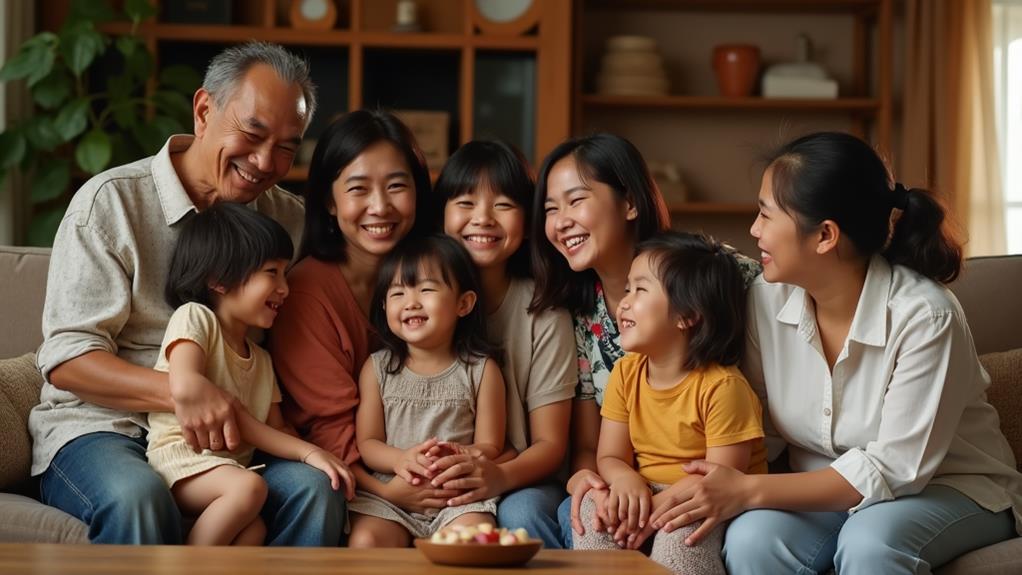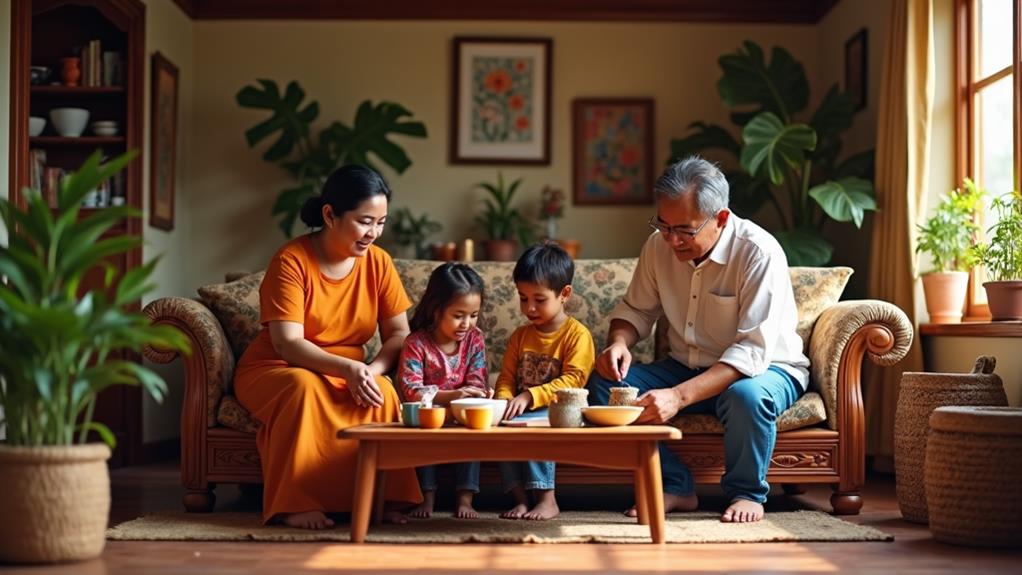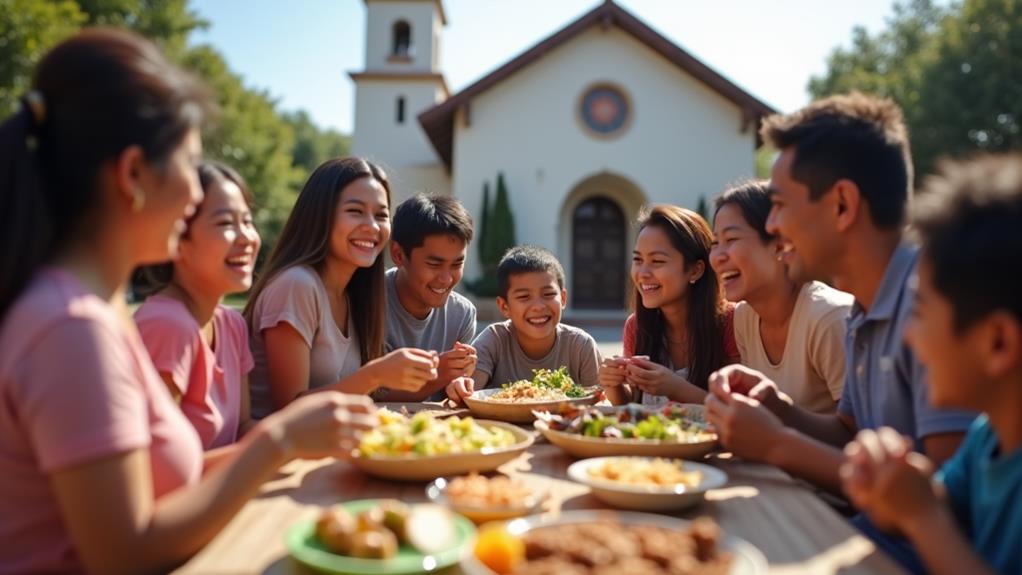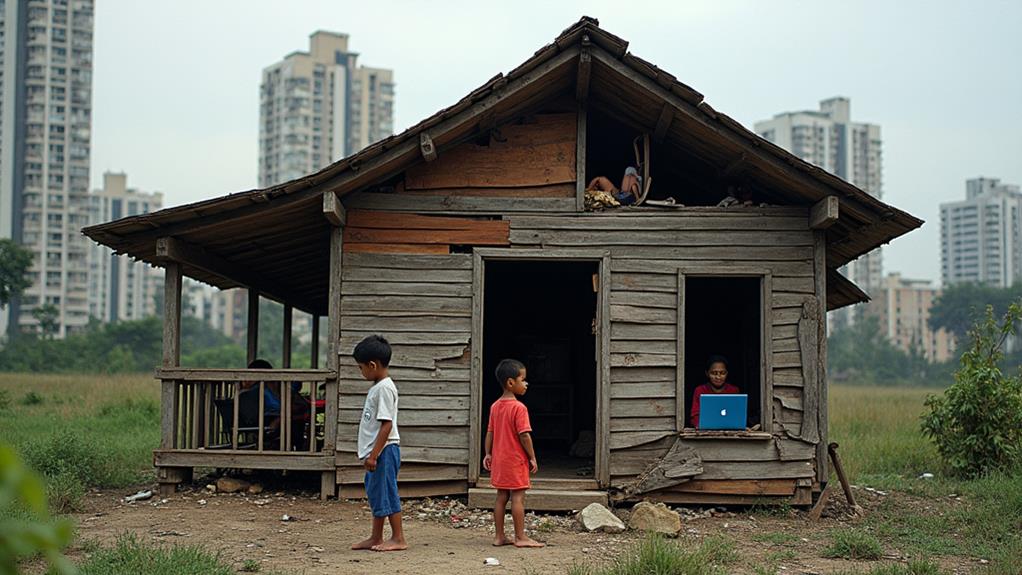Family is a fundamental aspect of Filipino society. The concept of “kapamilya” signifies a deep sense of belonging among family members. This sense of belonging is deeply ingrained in the culture and is often seen in three-generation households, where grandparents, parents, and children live together.
This setup allows for close relationships and intergenerational bonding.
Respect for elders is another essential value in Filipino culture. Younger members are expected to care for and show gratitude towards their elders through “utang na loob.” This cultural practice emphasizes the importance of caring for one’s elders in return for the sacrifices they made.
For example, younger family members often take care of their elderly parents or grandparents, providing them with financial support, emotional care, and companionship.
These values contribute to social harmony, familial stability, and a strong sense of community. Understanding these intricacies can provide insight into the Filipino cultural landscape.
The Concept of Filipino Family

The Filipino family structure extends beyond the traditional nuclear unit. Frequently, it encompasses extended family members, including grandparents, aunts, uncles, and cousins. This expanded family dynamic fosters unity and cooperation among family members, and filial piety is a core value that underlies these relationships. Filial piety emphasizes the duty of younger family members to care for and respect their elders.
The term “kapamilya” signifies a deep sense of belonging and solidarity among family members. This concept reflects the interconnectedness of familial relationships, highlighting the importance of family ties in shaping individual identities.
In the Philippines, three-generation households are common, with grandparents playing a significant role in raising grandchildren and maintaining family cohesion. For example, grandparents often help with childcare and household chores, allowing parents to work and support the family.
These family dynamics are influenced by cultural practices that reinforce the importance of family gatherings, such as celebrating milestones together.
Importance of Family in Culture
Family is a fundamental institution in Filipino society, playing a crucial role in shaping cultural values and individual identities. This importance of family in Filipino culture is evident in the concept of “kapamilya,” which emphasizes the deep bonds and solidarity among family members that extend beyond the nuclear family.
The family serves as a cornerstone in Filipino culture, providing essential support and guidance throughout one’s life. One of the core cultural values in Filipino society is filial piety, where younger family members show respect and care for their elders, reflecting a strong sense of duty and gratitude.
For example, children are expected to take care of their elderly parents and show respect through actions such as using honorific titles and providing financial support.
Frequent family gatherings and celebrations also reinforce bonds and cultural traditions. Birthdays and holidays are often celebrated with family gatherings, where traditional foods are served, and cultural values are passed down to younger generations.
These gatherings emphasize the importance of family and shared experiences in shaping cultural traditions and values.
Recognizing the significance of family in Filipino culture provides a deeper understanding of the values and principles that guide individual and collective behavior. By understanding the importance of family in Filipino society, one can gain insight into the cultural values and traditions that shape the behavior and identity of individuals.
Family Structure and Dynamics

Filipino Family Structure: A unique blend of traditional and modern elements characterizes Filipino family structures, with both immediate and extended family members playing significant roles in daily life.
The typical Filipino family is bilaterally extended and residentially nuclear, meaning that immediate family members live together with extended family members, such as grandparents and cousins. This setup is often seen in Filipino households, where three generations live together, fostering strong intergenerational bonds and support systems.
| Family Structure Characteristics | Description |
|---|---|
| Family Composition | Immediate and extended family members live together |
| Intergenerational Bonds | Three generations often live together |
| Household Management | The oldest female, usually the grandmother, manages income pooling and household responsibilities |
| Roles Among Family Members | Respect for elders is fundamental, with younger members expected to care for and honor aging relatives |
| Concept of Utang na loob | Emphasizes mutual obligation and gratitude among family members, reinforcing interconnectedness and loyalty |
In Filipino households, the head of the household plays a crucial role in managing the family’s daily life. The oldest female, usually the grandmother, manages income pooling and household responsibilities, ensuring the family’s needs are met. The concept of Utang na loob reinforces the loyalty and interconnectedness that are central to Filipino family dynamics, emphasizing mutual obligation and gratitude among family members.
Role of Elders in Filipino Families
Elders play a significant role in Filipino families, with grandparents often serving as primary caregivers for their grandchildren.
In the Philippines, it’s common for three generations to live together, fostering a strong intergenerational bond. This close relationship enables grandparents to provide guidance, support, and care to their grandchildren, strengthening family ties across generations.
Family members are expected to care for and show deference to older relatives, as respect for elders is deeply ingrained in Filipino culture.
In Filipino families, elders typically hold authority and serve as decision-makers and moral guides. This value is reflected in family gatherings and celebrations, which often honor elders and showcase their importance in the family hierarchy and cultural traditions.
Elders are also recognized as custodians of family history and values, with their contributions acknowledged through the cultural practice of “utang na loob.”
The cultural practice of “utang na loob” involves expressing gratitude for the sacrifices made by older family members, which strengthens intergenerational ties and reinforces family relationships.
Significance of Filial Piety

Respect for one’s elders is deeply ingrained in the Filipino culture, primarily through the concept of filial piety. Filial piety is a cultural value that emphasizes the importance of respecting and caring for one’s elders. This value is reflected in how younger family members prioritize caring for their aging parents or grandparents.
| Aspect | Description | Importance |
|---|---|---|
| Caring for elders | Providing physical and emotional care for aging parents or grandparents, such as helping with daily tasks or simply being present, demonstrates respect and gratitude towards family members. | Demonstrates respect and gratitude towards family members |
| Cultural practices | Celebrations and traditions honoring parental figures and ancestors, such as All Souls’ Day or Family Day, reinforce family lineage and heritage. For example, Filipinos often visit their ancestors’ graves during All Souls’ Day to honor and pay their respects. | Reinforces family lineage and heritage |
| Utang na loob | The obligation to repay good deeds received from family members strengthens filial piety and family ties. For instance, a child may take care of their aging parent as a way of repaying the care and support they received during their childhood. | Strengthens filial piety and family ties |
| Social harmony | Upholding filial piety contributes to social harmony and familial stability, as it guides interactions within the family unit. By showing respect and care for their elders, family members can create a more harmonious and supportive environment. | Guides interactions within the family unit
Family Relationships and Values
In Filipino society, family relationships and values are deeply intertwined. The nuclear family is at the core, but relationships extend far beyond, encompassing a wide network of relatives. This network includes extended family members who provide a sense of belonging and reinforce strong family bonds.
Each family member has a distinct role. Youth are expected to care for their elders, particularly aging parents and grandparents. This expectation is deeply rooted in the culture. For instance, younger family members often help with household chores and provide emotional support to their older relatives.
Two key values, Utang na loob and Pakikisama, play a crucial role in Filipino family dynamics. Utang na loob emphasizes the importance of repaying good deeds and support received from family members. For example, if a family member receives financial assistance from a relative, they’re expected to repay this debt in some way, such as by providing emotional support or helping with household tasks.
Pakikisama prioritizes social harmony and cooperation. This value encourages family members to work together and support one another. For instance, family members may pool their resources to help a relative in need or come together to celebrate special occasions.
Impact on Community and Society

When it comes to shaping community dynamics, strong familial ties play a profound role in Filipino culture, contributing to social stability and cohesion. This impact is especially evident in the way family support systems function. You’ll notice that these support systems play a significant role in shaping the very fabric of community life.
| Community Aspect | Family Influence |
|---|---|
| Social Stability | Family networks provide essential support systems |
| Economic Development | Family remittances significantly support local economies |
| Cultural Transmission | Family gatherings and celebrations preserve traditions
Families and relationships within them have a profound effect on community dynamics. The emphasis on filial piety, for instance, encourages younger generations to care for their elders, fostering a culture of respect and responsibility. This emphasis on respect and responsibility strengthens community ties. Furthermore, values such as cooperation and mutual aid, rooted in family relationships, influence community dynamics and contribute to collective identity among Filipinos.
Evolution of Family Traditions
The evolution of family traditions in the Philippines is a result of cultural heritage, external influences, and socioeconomic changes. The shift from communal to nuclear family structures occurred due to colonialism and modernization. Despite this shift, celebrations such as birthdays, holidays, and weddings remain significant, reinforcing family bonds and cultural heritage among members.
Traditional practices like Bayanihan, or communal cooperation during significant life events, still exist in varying forms, particularly in urban contexts. In Bayanihan, families and neighbors come together to help with tasks, such as moving or building a house. This practice strengthens community ties and reinforces the importance of cooperation.
The shift in traditional gender roles is another significant change in Filipino families. Women are increasingly taking on leadership roles in both the household and the workforce. For example, many Filipino women now work as professionals, entrepreneurs, or leaders in their communities.
The impact of globalization and labor migration has also altered traditional support systems. Many Filipino families rely on remittances from overseas workers to support left-behind relatives. This change reflects the adaptability of the Filipino family in navigating changing societal expectations and economic demands.
Challenges in Modern Filipino Families

Modern Filipino families face numerous challenges that threaten their cohesion and stability. These challenges arise from changing societal norms and expectations.
Changing family structures are redefining traditional roles and responsibilities. For instance, the rise of nuclear families, single-parent households, and blended families forces immediate family members to adjust to new roles and expectations. This shift often leads to confusion and conflicts, particularly when it comes to childcare, household chores, and financial responsibilities.
Economic stress is another significant challenge faced by modern Filipino families. The pressure to provide for one’s family can create emotional stress and affect family dynamics. Many family members have to work multiple jobs or migrate to other countries in search of better job opportunities, leading to prolonged periods of separation and emotional distress.
Shifting gender roles also pose a challenge to modern Filipino families. The increasing prevalence of dual-income households necessitates adjustments in expectations and responsibilities within the family. While this shift promotes more egalitarian relationships, it also requires family members to redefine their roles and expectations, often leading to conflicts and power struggles.
Mental health concerns are another critical challenge faced by modern Filipino families. Growing awareness of mental health issues highlights the importance of healthy communication and support systems. Family members must prioritize open communication, emotional support, and empathy to address dysfunction and foster resilience within the family.
To navigate these challenges, it’s essential to prioritize open communication, emotional support, and empathy within the family. By doing so, modern Filipino families can maintain a strong, close-knit family despite the challenges posed by changing societal norms.
Preserving Family Ties and Heritage
Frequent family gatherings in the Philippines play a crucial role in preserving cultural heritage and reinforcing family bonds. These gatherings often extend to distant relatives, showcasing the importance of extended family ties in Filipino culture. The term “kapamilya” emphasizes a deep sense of belonging and solidarity within the family unit.
For instance, traditional crafts and textiles, such as intricate embroidery, are often featured during these gatherings, reflecting the country’s rich cultural heritage and passed down through generations.
The family is a vital institution in preserving cultural heritage in the Philippines. Honoring ancestors and parental figures during celebrations is a key aspect of this heritage, highlighting the value placed on family lineage and respect.
Utang na loob, or the practice of repaying good deeds, fosters a culture of gratitude within families, emphasizing the importance of maintaining strong familial relationships. This value is highly regarded in Filipino culture, and festivals serve as platforms for transmitting it, ensuring that family heritage is preserved and passed down through generations.
Questions and Answers
Why Is Family so Important in Filipino Culture?
When examining the significance of family in Filipino culture, family is essential to their identity and sense of belonging. This emphasis on family is a result of historical and social factors that have led to the prioritization of family values and intergenerational relationships. Furthermore, the strong influence of Philippines religion and social justice has also contributed to the importance of family in Filipino culture. The predominant Catholic faith in the Philippines emphasizes the value of family cohesion and support, further reinforcing the significance of familial relationships. Additionally, in a society where social justice and community support are highly valued, the family unit serves as a source of strength and stability for individuals facing various challenges.
In the Philippines, social support and communal living are deeply rooted in the culture. Close living arrangements between generations create opportunities for intergenerational bonding, with many families living together in extended family households.
This close-knit environment allows for knowledge, traditions, and values to be passed down from one generation to the next, strengthening family ties and cultural identity.
Family is also a source of security and comfort in Filipino culture. In the face of challenges, Filipinos often rely on their family for emotional and financial support.
This support system is crucial in fostering a sense of security and belonging among family members. Ultimately, the importance of family in Filipino culture is reflected in the country’s social fabric and cultural identity.
What Is Meant by the Family Is the Cornerstone of Society?
When you consider the phrase ‘the family is the cornerstone of society,’ it implies that family serves as the fundamental unit upon which societal structures are built.
This concept is evident in the way family values are passed down through generations. For instance, in many cultures, the family unit plays a significant role in shaping cultural identity and influencing social norms, such as teaching children about traditional practices and customs.
Family also provides emotional bonding and social support, which strengthens community ties and fosters a sense of belonging. This, in turn, contributes to the overall stability of society.
Who Is the Cornerstone of the Family?
The cornerstone of a family is often a person who embodies the family’s values and holds it together. This person is typically a matriarch or patriarch. They provide parental guidance, such as helping children with their homework, resolving conflicts, and teaching life skills.
They also foster sibling relationships by planning family activities and encouraging teamwork. For example, they might plan a family game night or a volunteer day.
The cornerstone of a family also connects extended family members by hosting family gatherings and keeping in touch with relatives who live far away. They uphold cultural values by passing down traditions, such as cooking family recipes or celebrating cultural holidays. This makes them the glue that holds the family unit together.
The cornerstone of a family influences family roles and relationships through their leadership and example. For instance, they might model respect for others, honesty, and hard work.
What Is the Family Structure of the Philippines?
When examining the family structure of the Philippines, you’ll notice a blend of traditional and modern elements. A nuclear family serves as the core in most cases. This core often extends to include grandparents, aunts, uncles, and cousins, forming a close-knit extended family.
For example, grandparents may provide childcare or household assistance, while aunts and uncles may help with financial or emotional support.
Family roles in the Philippines are clearly defined. Each member contributes to the household. Typically, parents work outside the home to earn a living, while children attend school.
Older family members, such as grandparents, often care for younger children or assist with household chores.
Regular family gatherings reinforce family values in the Philippines. Loyalty and obligation are deeply ingrained in Filipino culture.
For instance, Filipino families often prioritize family needs over individual desires. This emphasis on family loyalty and obligation helps maintain strong family bonds.